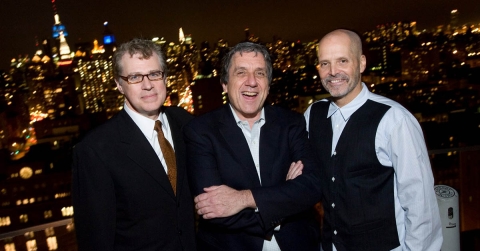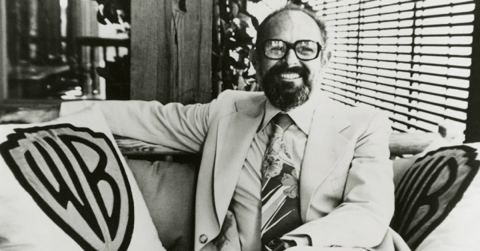By Robert Hurwitz
Nonesuch President Robert Hurwitz shares some thoughts on working with Peter Clancy, the label's Senior Vice President for Marketing, for the past 22 years.
By Bob Hurwitz
In a few hours, I will be having lunch with my close friend and colleague Peter Clancy. It will be the 22nd straight Tuesday after Labor Day that Pete and I have gone out to lunch; we have never gone to the same restaurant twice. It is our anniversary lunch: Peter and I began working at Nonesuch on Tuesday, September 4, 1984. Our first office was in the Rolex Building at 52nd and Fifth Avenue; we shared a large room, which had been recently vacated by Bruce Lundvall, when he left Elektra to go to Capitol Records. Bruce, of course, is the legendary President of Blue Note; that day, Ron Goldstein, who is now the President of Verve, sent us a giant basket of food. About 4 in the afternoon, Peter said, “There doesn’t seem that much to do.”
It was the last time he uttered those words. For 22 years, Peter has performed—I use that word intentionally—at a remarkable level, most of the time as Vice President of Marketing. Peter is a born performer: he performed, as a percussionist, in the New Jersey premiere of Steve Reich’s Four Organs; recently, he’s performed as a drummer in a rock band, as a percussionist in a local New Jersey classical ensemble. He sings in a chorus. He is a wonderful painter, a guitarist, a great chef; he learned to play the organ in prep school, and taught himself the piano so he could accompany himself singing Schubert’s Winterreise. We at Nonesuch have seen him perform every day at the highest level as our one-man marketing department. I am hard-pressed to think of another individual in our business who has had as many marketing successes with left-field, out of the mainstream records as Peter: the Gorecki Third Sympyhony, the Buena Vista Social Club, the Kronos Quartet, the Gipsy Kings, Cesaria Evora, Le Mystere des Voix Bulgares, Philip Glass, Steve Reich. All of these are now famous artists or projects; none of them were when Peter started out with them.
When we started, Peter and I were a two-man team. Although he had only worked in publicity in his previous job at Mercury/Philips, he immediately took on the responsibilities of sales, advertising, promotion, merchandizing, packaging, design. He approached each job as if there was nothing else in the world, and I am certain if he followed any of those paths, he would be successful in each field.
It is easy to sentimentalize the past, to think with fondness about one period over the other, but there isn’t a single period working with Peter that I find particularly more special than another. There wasn’t a time when he seemed distracted, or not fully engaged. We almost lost him on a number of occasions: everyone in the business knew how strong, competent, reliable, creative Peter was, and I remember at least five times when he was offered “bigger, better, better paying” jobs. I never tried to persuade him to stay, because my respect and affection was so great that of course, I wanted the best for him. Each time, he graciously declined. In retrospect, I can only begin to think how much we would have suffered if he were not here.
I first became aware of Peter at a performance of Steve Reich’s Music for 18 Musicians at the Whitney Museum. I was with Carol Peterson, my girlfriend at the time (and now my wife); she spotted Peter walking by and said, “There’s that nice Peter Clancy.”
Peter was in his early 20s at the time, in his first job in the record business. I made a mental picture—a good-looking guy, handsomely dressed in a sports jacket and tie, glasses, a genuine presence. I don’t even remember if we ever spoke that night, but in the following years, I’d hear from Peter from time to time; he’d send me an album of an artist he heard I liked; he dropped me the nicest card when he heard that Carol and I were getting married. Who is this guy?
The nice Peter Clancy. There are no reality shows on tv that celebrate decency; it’s an attribute we rarely think about any more. But Peter, who works all the time, who is deeply devoted to his family, who is fully engaged every minute of the day, is the most decent person I have ever met. It’s so easy to be cynical, critical, nasty, whiny, in this world, and especially in this business. I have seen him frustrated, I have seen him upset, I have seen him overwrought, but he never seems to take it out on anyone. He speaks with the same tone of voice to an artist as he does to a salesman as he does to a taxi driver. He seems to like everyone he comes in contact with, he is one of those rare people who only measures people by their the good he sees him them. And everybody likes Peter: in my job, you end up hearing complaints about everyone, but I don’t remember an unkind word about Peter in all the time we have known each other.
I sometimes have to stop myself: Peter Clancy. It’s unbelievable: we’ve stayed together longer than kids in the house where they grew up. He’s been here every day, and there hasn’t been a day where he did not care deeply about what we were doing. Where would Nonesuch be without him?


